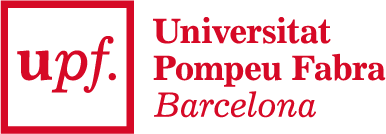Partner universities
The EMAI program aims to be an excellence integrated transnational Master program delivered by an European consortium of four higher education institutions in four countries with the cooperation with other partner institutions and organisations in Europe and worldwide, with diverse profiles including universities and educational partners, and other ones linked to the industry and research in the AI expertise areas, such as big, medium and small companies, or networks.

The Pompeu Fabra University (UPF, coordinator) is a public, international, and research-intensive university that, in just twenty-five years, has earned a place for itself among the best universities in Europe. Awarded with a CEI label (International Excellence Campus) by the Spanish Ministry of Education, UPF consistently ranks among the top five Spanish universities in terms of academic efficiency and is the first one in the national ranking of scientific productivity since 2009. Founded in 1990, UPF stands out for high quality in teaching, excellence in research and a strong vocation for international outreach.
The EMAI is hosted by the Engineering and Information and Communication Technologies Academic Unit (ETIC). The ETIC was established in 1999 and is a young and energetic multidisciplinary department pushing to achieve excellence in areas such as Cognitive and Intelligent Systems, Audio-visual Technologies, Networks and Communications, Brain and Cognition, Computational Biology, and Biomedical Systems. The ETIC holds 21 cumulative ERCs, 10 ICREA Research Professors and has one of the major internationalisation ratios among UPF departments, with 66% of international staff and 60% of international postgraduate students. DTIC is one of the two Spanish ICT university departments that had been awarded the Maria de Maeztu Excellence by the Spanish government for the quality and relevance of its pioneering scientific research and as the top IT research concentration in Spain.

The Sapienza University of Rome (Sapienza) is one of the largest and oldest universities in Italy. It has established itself as one of the most prestigious academic institutions in science and technology in Europe. In 2021, the Centre for World University Rankings ranked Sapienza 113th in the world and the top in Italy.
The EMAI is hosted by the Dipartimento di Ingegneria Informatica Automatica e Gestionale Antonio Ruberti (DIAG), a multidisciplinary research and education centre that hosts more than 70 Sapienza faculties and 10 research labs from the School of Computer Science and Engineering. Basic research is the main goal of DIAG, with a strong emphasis on interdisciplinary research, on applications that stimulate basic research, and with specific attention to technology transfer and dissemination of results. From a research perspective, DIAG has strong experience in Artificial Intelligence, Big Data, Process Management and Mining, and Cybersecurity. DIAG was awarded as “Excellent Department” by the Italian Ministry for Education and Research (MIUR), on the basis of the high-quality research, education and knowledge transfer activities performed over the last 5 years and allowing special funding for new positions and laboratories.

The Radboud University Nijmegen (RU) is in the top one percent of universities in the world. According to the Dutch university information guide Keuzegids Universiteiten 2020, Radboud University is the best traditional, general university in the Netherlands. RU offers 55 Bachelor’s programmes, 14 of which are taught in English, and almost 60 Master’s programmes. In the ARWU ranking 2022, it is ranked 102 in the world; in the Times (THE) 2023, the position is 139. Radboud University belongs to the Guild network and is the leader of the European University of Brain and Technology NeurotechEU.
The EMAI is hosted by the Faculty of Science, one of the seven university faculties. It runs seven Master's programmes, all taught in English. There are about 3,500 undergraduate and graduate students, about 800 scientific staff and 250 supporting staff at the Faculty. Artificial Intelligence, however, belongs to the Faculty of Social Sciences for historical reasons and originated from a more psychological approach to AI. Students of the new master can benefit from the expertise of both Faculties.

The University of Ljubljana (UL) is the oldest university in Slovenia with a rich history, founded in 1919. Over 40,000 students upgrade and develop their knowledge and skills at the country’s largest educational institution, famous for top-quality achievements in social science, natural science, humanities, and engineering degree programmes, as well as for artistic achievements by the three academies.
The EMAI will be hosted by the Faculty of Computer and Information Science (UL FRI). The Faculty currently offers five study programmes and seven interdisciplinary study programmes with other faculties within the University. Research activities are carried out in 19 laboratories with a focus on artificial intelligence, data mining, deep learning, intelligence systems, bioinformatics, IoT and data science.
